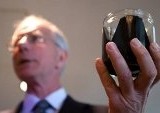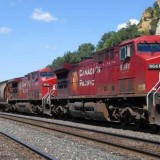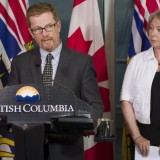Herb Grubel, a professor emeritus of economics at SFU, is a far right “Fellow” of the Fraser Institute – forgive me, that’s, of course, redundant.
I’m not sure if he shares the views of Fraser “Fellow” Walter Block, namely that a poor woman with kids she can’t afford to support should be able to, if she wishes, enter into a slavery contract with a rich man who promises to look after them. (Whether this consensual slavery includes bedroom privileges I can’t say.)* I interviewed Grubel a dozen or more times when he was a Reform MP and although the point never arose, Grubel is uncritically supportive of the free market system which is what Dr. Block rests his case upon.
If Grubel wishes to comment on this we will be happy to print it.
*(Read my opinion piece in The Tyee several year’s ago on Block and his colleagues, followed by Block’s own rebuttal)
Fellow Fraser Institute “Fellow” Fazil Mihlar is in charge of the Vancouver Sun’s editorial pages and in today’s Sun (August 1) is an op-ed piece by Grubel. (I’ve been a writer for over 30 years yet have never been so honoured – I wonder why?)
Grubel gives advice as to how Premier Clark can get more money out of the Enbridge line and, frankly, that doesn’t interest me, for reasons I will go into.
Grubel believes that pipeline operators are already required to clean up spills…that the government should create a trust to match clean-up costs in excess of the costs not covered by insurance. He goes on to point out that tugs could be used to move tankers…other measures will be developed, he says, to be applied to the prevention of oils spills on land and sea.
Here is the critical part:
No measures, however expensive, can prevent all oil spills, (emphasis mine – RM) as the small minority of self appointed guardians of the environment and their allies in the media (the media??? – RM) are fond of pointing out. Only the outright prohibition of all oil transport will end all risks.
Grubel goes on to say that sensible British Columbians will vote for politicians “who support policies ensuring they will continue to be able to keep their homes warm, their cars running and shelves in their stores stocked while they enact and enforce policies that induce pipeline operators to adopt the best methods for minimizing oil spills and maximizing the protection of the environment.”
Before getting to the point of the matter, let me congratulate Grubel for acknowledging that
spills are inevitable – a critical admission for what I will say in a moment.
Dr. Grubel, as one of the “self appointed guardians of the environment”, I can only tell you that unlike your friends in the oil industry, we exist with very little funding and what we get is sporadic. So far at the Common Sense Canadian we have yet to receive our first foreign dollar.
Now to the meat of the matter.
Dr. Grubel glosses over the most important fact in this controversy – the oil spills he speaks of as certain cannot, for all intents and purposes, be cleaned up.
It is this fact that throws Grubel’s arguments out the window. We’re not dealing with gasoline, natural gas, bunker oil or ordinary crude oil but gunk called bitumen. When there is a spill in water, the condensate, which allows the bitumen to be piped, separates, leaving the bitumen to sink like a stone. I don’t suppose that Grubel has read about the Enbridge/Kalamazoo spill which occurred in a populated state and was accessible by equipment and how Enbridge has been unable to clean it to this day, more than two years later.
Grubel cannot have considered where the Enbridge pipeline is destined to travel – 1,170 km over two mountain ridges (The Rockies and Coast Range), through the Rocky Mountain trench thence into the Great Bear Rain Forest. It would cross nearly 1,000 rivers and streams, most of which are essential to salmon populations. Even a Milton Friedman disciple ought surely to be able to take a moment to be human and reasonable and see that the Enbridge pipeline would be an ecological disaster of huge proportions – and permanent.
There is another point seldom raised which is of considerable concern – this pipeline will have regular leaks and fractures, each time creating a new, permanent ecological wipe-out, meaning we are looking at serial disasters.
As to tanker traffic, Grubel admits that there will be spills but industry will mitigate the consequences. He’s unable to get his head around the fact than any spill on our coast will have permanent, horrible consequences. Perhaps Grubel has never seen our north coast.
What Dr. Grubel has done is demonstrate, clearly, what we “self appointed environmentalists” have been saying all along – spills on land and sea are inevitable and that no amount of money will be sufficient compensation.
He has failed to consider that the consequences of those spills will be permanent, ongoing, serial catastrophes.
“Sensible British Columbians” know this and will take that knowledge into the polling booth.
A response from Herbert Grubel (published August 23, 2010)
Rafe has always been fair in our numerous discussions on CKNW when I was a member of the Reform Party in Ottawa during the 1990s. Such fairness was rare at those times when the media were out to demonize the Reform Party. I will always gratefully remember our efforts to bring rationality to the issues of the day by considering the benefits and costs of government policies, even if we ended up disagreeing on the final results of such calculations.
It surprises me that Rafe now seems to deny the need for the consideration of costs and benefits when it comes to human activities that affect the environment. But before I elaborate on this point, let me take up the challenge of responding to one of Walter Block’s outrageous positions on public policy.
Walter is the poster boy for Libertarians. In a recent public debate we had over some government policy he said that my views are those of a pinko and fascist. That should be enough to establish the fact that I disagree strongly with most of Walter’s ideas and that includes the one he advanced about what a widowed mother should do to feed her children. On the other hand, I believe that Libertarian principles should inform all public policies but that compromises are needed to accommodate the large range of other values held by people in a free society.
There is an irony in the fact that the views of both Walter and Rafe are based on the acceptance of absolutes. For Walter it is freedom, for Rafe it is the preservation of nature in its raw state. In a world in which humans exist with all of their needs and preferences, compromises have to be made.
Rafe’s rejection of my suggestion that the government should insist on the creation and enforcement of rules that minimize the incidence and severity of spills and maximize the dedicated cleaning efforts in the case of such spills rests firmly on his adherence to the view that nothing should ever be done to alter the existing state of nature.
This position is indefensible and impractical. All human activities carry risks. We may get injured or killed when we take a shower or drive a car. Yet, we take showers and drive cars because the benefits are greater than costs, especially after we have made all feasible efforts to minimize accidents.
I am willing to bet that Rafe does engage in all kinds of risky activities and I am at a loss to understand why he insists that collectively taken human activities like the transportation of bitumen should be allowed only if it carries a zero risk of damage to the environment.
I find it ironic also that the proudly liberal and progressive Rafe is extremely conservative when it comes to the environment. He insists that humans should do nothing ever that changes the existing ecology of a piece of land or a body of water. Political conservatives he despises similarly insist on the preservation of existing laws and institutions.
The fact is that nature itself constantly changes the environment, gradually through evolution and suddenly with floods, fires, volcanic eruptions, the impact of meteors and other such events.
I see nothing unnatural and catastrophic in the fact that the clean-up efforts of humans and nature have left a thin layer of oil one foot below the surface of the beaches that had been covered with oil from the Exxon Valdez spill in 1989. A previously alien species of bacteria is still busy at work gorging itself on this layer while its existence enriches rather than lowers the variety of life forms in the area. For Rafe this addition to the ecology somehow is a catastrophe of the sort that must never be allowed to occur.
Rafe and I will agree to disagree on environmental and many other issues of public policy. I hope he will keep up his work and continues to insert his absolute values into the debate over public policies. I will take his, as well as Walter’s views into account whenever I assess the practical merit of collective actions affecting the welfare of our fellow humans and the environment.
In the meantime, we should all celebrate that we are able to have the kind of exchange of views exemplified by this response to Rafe’s comment on my Vancouver Sun editorial. We live in a great, if imperfect society and time in history. It would be even greater if we could agree to refrain from attaching to our opponents inflammatory labels. Calling me “far-right-wing” is not the way to cultivate needed and civilized exchange of views.










